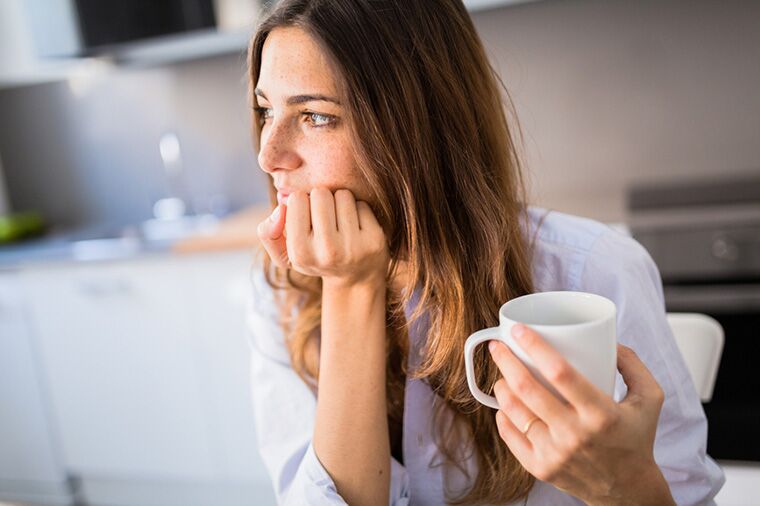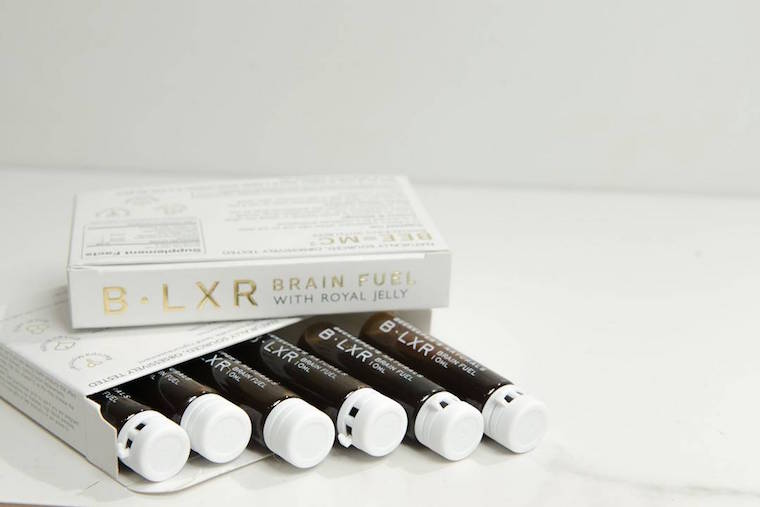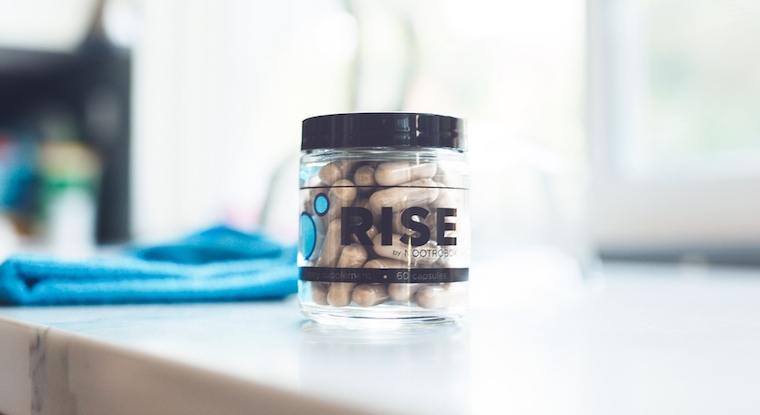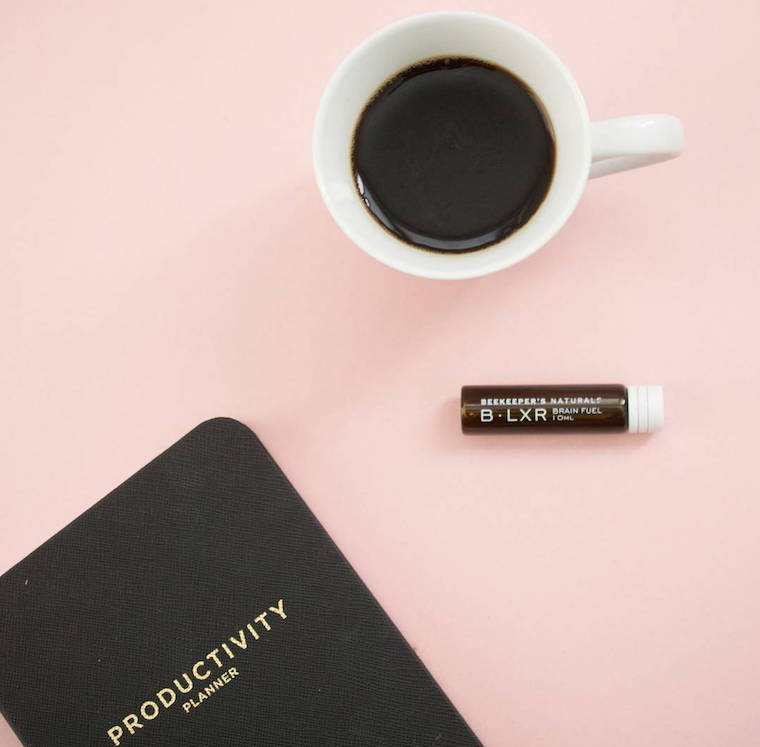Enter nootropics, supplements crafted to reduce brain fog and stress. And it's not just the Silicon Valley set throwing them back anymore—you're going to see them everywhere in 2018. Now, they're popping up not only in capsules, but vials, coffee, and even snack bars.
Curious about whether they really worked, I decided to give nootropics a try, committing to taking one a day for a week. Would I zip through my work, making time for some online shopping and Buzzfeed quizzes? Or maybe the nootropic boost would allow me to work better, preventing that dreaded afternoon slump and inspiring me to work long and hard well past sunset. Or maybe the whole thing would be a waste of money.
Ready to find out what happened? Keep reading.

How nootropics work
For my week-long experiment, I decide to try two different nootropic brands I'd been hearing about: Beekeeper's Naturals B.LXR, which lists royal jelly as the primary ingredient, and HVMN's Rise, made with alpha-GPC (or a-GPC), a high-potency precursor to the neurotransmitter acetylcholine, which is essential for learning and memory.

{{post.sponsorText}}
My first thought is that this habit isn't exactly cheap. Six vials of the Beekeeper's Naturals' nootropics is $30, while 60 Rise capsules costs $49. I sort of hope they won't work—I certainly don't need anymore expensive wellness habits. (I'm looking at you collagen and spirulina.)
Since their ingredients lists differ a bit, I call up the CEOs of both companies for more intel. "Royal jelly is one of the most amazing superfoods for the brain," Beekeeper's Naturals CEO Carly Stein tells me. She explains that it's one of the few naturally occurring precursors to acetylcholine—similar to the a-GPC in Rise. "Acetylcholine helps with processing information," she says, adding that people with neurodegenerative diseases like Alzheimer's are low in acetylcholine. According to Stein, boosting your intake can help prevent cognitive decline.
Another reason Stein says she's obsessed with royal jelly is because it contains 10-HDA, a fatty acid that supports a protein called brain-derived neurotrophic factor (BDNF). "We tend to be low in BDNF because things like stress and a poor diet can diminish it, and not having enough can lead to low-energy, brain fog, and depression," she says.
Other power players in the B.LXR include ginkgo (an OG natural brain booster) and bacopa (an adaptogen linked to supporting brain health and lowering anxiety). "A lot of people get brain fog because they are exposed to mold and other pollutants, and bacopa helps counteract that," Stein says.
It's one of the starring ingredients in Rise, too. The other big ingredient: rhodiola rosea, a plant often used in Traditional Chinese Medicine. "The studies with rhodiola rosea were done on Russian Army cadets doing long, overnight missions," HVMN CEO Geoff Woo says. "One group was given it while a control group took nothing. The soldiers who took rhodiola rosea performed higher on math and other cognitive tests both groups were given," he says.
Now that I know a bit more about what I'm about to take, I'm ready to get started.

Nootropics: Take one
Normally, I start my day with Bulletproof coffee for breakfast, but because I don't know how nootropics and caffeine interact, I crack open a vial of the Beekeeper's Naturals elixir and down that instead. Drinking it is like sipping light, viscous honey. Literally: You have to really like honey to like this nootropic.
I fire up my computer and start responding to emails, waiting for the effects to kick in. With all the talk of nootropics being "smart drugs," I expect an Adderall-like effect, or maybe the revved-up sensation of drinking a cup of coffee too fast. But even a couple hours into the work day, what I feel is...nothing.
Wondering if it's a fluke, I repeat the process the second day. Again, nothing. Maybe it's just me, I wonder that afternoon. I decide to call for backup and hand three of my work friends each a vial. They cheers each other and, bottoms up! A couple girls at the next table look over wide-eyed, probably wondering why we're all knocking back shots in the middle of the workday. In case you couldn't guess, Well+Good is not that kind of office.
"Wow, I feel so focused," one editor proclaims. WTF! Why is this working for everyone except me?
"I think I feel it," one of the editors on nootropics Slacks me. "I couldn't focus on writing anything 20 minutes ago, but I just banged out three whole paragraphs in like two minutes," she says. "Whatever, that's probably placebo," I type her back, semi-jealous of her speedy writing.
"Wow, I feel so focused," one of the other editors stands up and proclaims, 45 minutes after taking her vial. "Oh my god, I do, too!" the third person says. "I feel like I had a cup of coffee, but not jittery." WTF! Why is this working for everyone except me? I turn to Stein for some help.
"Try taking it with your breakfast or a Bulletproof coffee," she tells me. "The ingredients are fat soluble, so it will work better that way." The fact that I don't have to give up my morning coffee is (welcome) news to me. "There's not caffeine in it at all, so you can definitely still have your coffee. That said, the product does work and if you want to know for sure it's the nootropic and not your coffee, take it without." Girl, please: You know I'm having that coffee.
The next day, I take Stein's advice, first having coffee and an English muffin with cream cheese and avocado. I wait 30 minutes to have the nootropic elixir. This time, I feel it. Stein's right—at least for me, the trick was having some food in my system for it to work. I feel just like my coworkers claimed they did the day before: focused, but not jittery. And while I certainly don't feel like working past my 6 p.m. quitting time, my afternoon slump doesn't appear like it usually does. Success!

How nootropics affect sleep—and your workout
On day four, I decide to try Rise. Like Beekeeper's Naturals, Rise doesn't contain any caffeine and Woo tells me it uses an entirely different pathway in the body. But, again, wanting to see how I feel only on the nootropic, not coffee, I avoid caffeine altogether. This time, I take the nootropic—in capsule form—at 3 p.m., right when I'm starting to lose steam.
It takes about 30 minutes for me to feel anything, but with Rise, I notice a stronger effect. I feel uber aware of what's happening around me, intensely focusing on the conversation my work friends are having next to my desk. And then, intensely focusing on an article I'm on a deadline to file. I finish it with time to spare. I feel energized throughout the afternoon, but it wears off by the time I tuck myself into bed—I have no trouble falling asleep.
"Some people actually like to take Rise right before they go to sleep because it can lead to vivid or lucid dreaming," Woo says. I'm more interested in taking it to work more efficiently during the day, but good to know, right?
The next day, I decide to take Rise right before heading to a high-powered yoga class. Fueled by nootropics, would I be able to take "mind over matter" to new levels, holding my chair pose low and strong despite burning quads? Sorta! Similar to how I was able to heighten my focus at work, I'm able to focus on the moves more—suddenly super-aware of what my body is doing.

How my nootropics habit is playing out now
For the rest of the experiment, I switch from taking a nootropic in the morning to the afternoon, in place of a second coffee. And my work friends catch on to my habit, too.
"Omg, I can't focus. Can I have a noob?" one of the editors Slacks me. I reach into my supply and hand her a couple capsules of Rise. "Thank you!!!" she writes me, with five praise hands emojis.
Suddenly, I 've become the office smart-drug dealer.
An hour later, I get another Slack from someone in another department (someone I don't even know that well): "Hey, I heard you have some nootropics over there. Can I have one? I have a major project due!" Suddenly, I've become the office smart-drug dealer.
Here's the thing: I'm happy to share my smart drugs with my friends, but it's an expensive habit and I can't just keep giving them away for free. Still, I meet her by the bathrooms and slip her a couple capsules. (Seriously—I've become the girl who skips class to make deals with nefarious characters behind the bleachers...only, what I'm shelling out would make you a better student.) "Don't tell any more people I have nootropics!" I Slack my work friend. I need to protect my supply.
Now, a couple weeks past the end date of my week-long experiment, I take nootropics on an as-needed basis. I 100 percent buy into the idea that they are good for your brain and safe to take on the reg. This is just how it fits into my life best—and my bank account.
Originally published December 29, 2017. Updated June 24, 2018.
Speaking of pricey wellness habits, here's how much people with different salaries spend on wellness. Another way to give your brain a boost: eating these foods.
Loading More Posts...